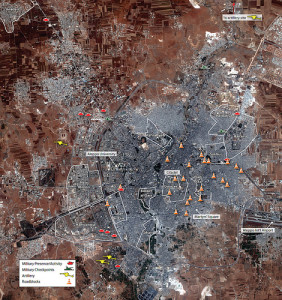I listened to the snow bursting under the tires/ like teeth crunching an apple/ and I felt a wild desire to laugh/ at you/ because you call this place hell/ and you flee from here convinced/ that death beyond Sarajevo does not exist
“Corpse” – Semezdin Mehmedinović
Amnesty International, in cooperation with Science for Human Rights has published a series of satellite images of the city of Aleppo. The images show evidence of the use of heavy weapons and artillery in residential neighborhoods. We knew this, but the independent confirmation is important.
I used to live in Aleppo. The streets and neighborhoods now listed in battle dispatches are places where my friends live, where I shopped for books and went for walks in the evening.
What those satellite images can’t show is the human misery that has befallen the city of some 4 million people. Refugees are moving from one neighborhood of the city to another in advance of government forces and my contacts in the city tell of schools and churches filling with displaced people and shortages of everything. Electricity, water, sewage have failed; food has disappeared from store shelves and state bread bakeries – which feed the city subsidized flat pita – have run out of flour. The specter of kidnapping for profit, which was a hallmark of the civil war in Iraq, is rampant, and the fear of reprisals against Christians and Armenians whose leadership have been among the régime’s supporters grips those communities.
Despite my earlier thought that the Battle for Aleppo would be short, it appears that the Free Syrian Army rebels have dug in. The ferocity of the régime’s response also tells me that for it, recovering the city and dealing a decisive blow to the rebels have become absolute necessities. If it loses Aleppo, it loses northern Syria – from the Turkish border to Iraqi Kurdistan. The rebels would then be able to resupply at will and establish in the city an alternative government. Aleppo would be the new capital of a “Free Syria” – complete with an international airport and the physical infrastructure of a government.
The rebels have fought running battles throughout Aleppo, and have now moved into the city’s ancient walled old city. The old city is a collection of narrow streets, winding alleys and cul-de-sacs. The walls of the houses are made of thick cut stone. The rebels could hold out here for weeks. My fear – beyond the human cost – is that the Syrian army will, as it hunts down its enemies, harm the mosques, churches and caravansaries that led UNESCO to designate the city a “World Heritage Center.”
What the satellite images also confirm is that nothing — international opprobrium, the Geneva Accords, nothing restrains the Syrian army. What I think is happening is that the Syrian Army is beginning to encircle pro-rebel neighborhoods: Salah al-Din, Hannanu, Sakhur, and Ashrafiyya. These are among Aleppo’s newest neighborhoods and are inhabited by immigrants from the countryside. IDPs fleeing fighting near the Turkish border have also fled to these places, often because they have relatives there.
These neighborhoods will then become free-fire zones, where anyone is a target – whether rebel or civilian. This is what the régime did in Homs earlier this year. I’m not sure that this will have any real military value, but act to terrorize the surviving population, and reassure the elite of Aleppo and Damascus that the régime is prepared to do everything it can to stay in power.
Massacres in Aleppo will dwarf what has happened so far.
Aleppo, unlike nearby cities of Beirut, Damascus, or Jerusalem hasn’t been the scene of a battle since the time of Tamerlane some 600 years ago. That doesn’t mean it hasn’t changed hands. Conquerors from the Mamluks, to the Ottomans and the French all preferred to negotiate the city’s surrender to trying to breach its walls and capture its imposing citadel.
I worry that Aleppo will now join Sarajevo in our collective imagination as a once vibrant cosmopolitan city reduced by the fires of hatred to a monument to inhumanity.
I will write more as I am able to resume contact with friends in the city.

